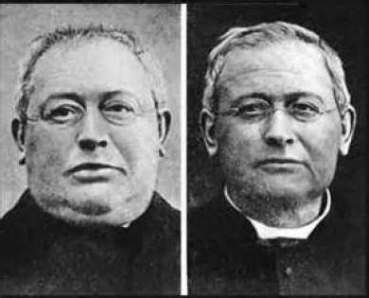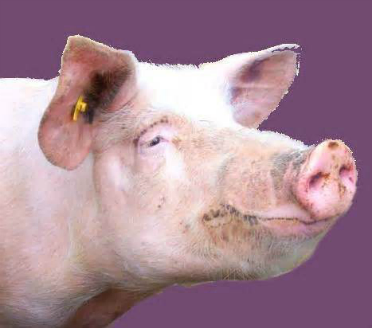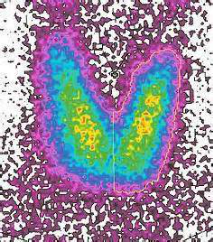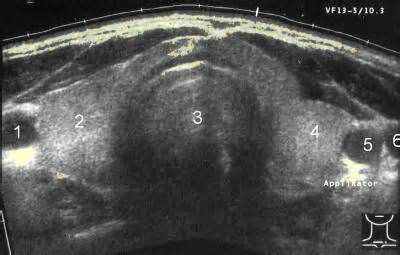 New Study Shows Natural Thyroid is Better than Synthetic
New Study Shows Natural Thyroid is Better than Synthetic
by Jeffrey Dach MD
Left image: Man with Hypothyroidism. Left Panel is before
treatment, and Right Panel is after treatment with natural thyroid pills
NDT natural desiccated thyroid Photos taken from and courtesy of Mark
Starr MD’s book, entitled Hypothyroidism Type 2: The Epidemic.
American Thyroid Association (ATA) Guidelines
Natural Thyroid has been used successfully for more than 100 years (3), and it is blatantly obvious to any experienced clinician that natural desiccated thyroid is superior to T4-only medications such as Synthroid and Levothyroxine. However, in spite its obvious clinical superiority, Endocrinology Societies such as the ATA have published guidelines advising doctors to stay away from natural thyroid. (1) Over the years, they have used a variety of reasons. The latest reason is that there are no controlled trials . Here is the quote from the ATA Guidelines:
“As of 2012 there are no controlled trials supporting the preferred use of desiccated thyroid hormone over synthetic L-thyroxine in the treatment of hypothyroidism or any other thyroid disease.”(1)
A New Controlled Trial Comparing Natural Thyroid to Synthroid
 This
has changed, as a new controlled trial was just published in the May
2013 Journal of Endocrinology by endocrinologists at the Walter Reed
National Military Medical Center in Bethesda, Maryland (2)
This
has changed, as a new controlled trial was just published in the May
2013 Journal of Endocrinology by endocrinologists at the Walter Reed
National Military Medical Center in Bethesda, Maryland (2)
Left image: natural thyroid comes from a pig thyroid gland.
Switching OVER to Synthroid
When a new patient comes into the Walter Reed Medical Center on natural thyroid, they are immediately switched over to Synthroid (or T4- only meds).
Occasionally DID NOT Feel As Well
The authors’ usual practice is to switch any new patient over from natural thyroid to Synthroid (T4-only levothyroxine). However, the doctors noted that after doing this:
“Patients on natural thyroid (desiccated thyroid extract ,DTE), after being switched over to levothyroxine (l-T4), occasionally did not feel as well , (despite adequate dosing based on serum TSH levels.) “(2).
This is exactly what I have found in actual clinical practice over the years. Patients feel much better on natural thyroid. We use exclusively Nature-throid from RLC labs with good results.
 Left Image: radionuclide scan of thyroid gland.
Left Image: radionuclide scan of thyroid gland.
Comparing Synthroid to Natural Thyroid
Their controlled study compared natural thyroid with Synthroid. What they found was that roughly half of the patients (48%) felt better on the natural thyroid, one third had no preference, and one fifth (18.6%) felt better on the Synthroid. Clearly the natural thyroid wins the comparison test (48.6% vs. 18.6%).
“At the end of the study, 34 patients (48.6%) preferred Dessicated (Natural Thyroid), 13 (18.6%) preferred Levothyroxine (T4), and 23 (32.9%) had no preference.”(2)
Now that we have a controlled trial showing the natural thyroid is better, maybe the ATA should change its guideline?
Combined Therapy Preferred
A 2005 study by Appelhof from Amsterdam showed that patients preferred a combination of T3 and T4 therapy for the low thyroid condition. Click Here for a list of these studies.
 Left image: Ultrasound image of thyroid gland.
Left image: Ultrasound image of thyroid gland.
Articles with Related Interest:
This is Part Two, for Part One Click Here
Why Natural Thyroid is Better Than Synthetic
Author: Jeffrey Dach MD
Finanical Dislosure: The author, jeffrey dach md, receives no compensation from RLC labs nor from any other thyroid medication manufacturer.
Links and References:
1) ATA_AACE_Guidelines_Hypothyroidism_2012_natural_thyroid
Garber, Jeffrey R., et al. “Clinical practice guidelines for
hypothyroidism in adults: cosponsored by the American Association of
Clinical Endocrinologists and the American Thyroid Association.” Endocrine Practice 18.6 (2012): 988-1028.
“Thus, there are no controlled trials supporting the preferred use of desiccated thyroid hormone over synthetic L-thyroxine in the treatment of hypothyroidism or any other thyroid disease.”
2) http://jcem.endojournals.org/
http://jcem.endojournals.org/
J Clin Endocrinol Metab. 2013 May;98(5):1982-90.ENDOCRINE CARE ,
Desiccated Thyroid Extract Compared With Levothyroxine in the Treatment
of Hypothyroidism: A Randomized, Double-Blind, Crossover Study
Thanh D. Hoang, Cara H. Olsen, Vinh Q. Mai, Patrick W. Clyde and Mohamed
K. M. Shakir – Author Affiliations Department of Endocrinology (T.D.H.,
V.Q.M., P.W.C., M.K.M.S.), Walter Reed National Military Medical
Center, Bethesda, Maryland 20889; and Department of Preventive Medicine
and Biometrics (C.H.O.), Uniformed Services University of Health
Sciences, Bethesda, Maryland 20814
Context: Patients previously treated with desiccated thyroid extract (DTE), when being switched to levothyroxine (L-T4), occasionally did not feel as well despite adequate dosing based on serum TSH levels.
Objective: Our objective was to investigate the effectiveness of DTE compared with L-T4 in hypothyroid patients.
Design and Setting: We conducted a randomized, double-blind, crossover study at a tertiary care center.
Patients: Patients (n = 70, age 18–65 years) diagnosed with primary hypothyroidism on a stable dose of L-T4 for 6 months were included in the study.
Intervention: Patients were randomized to either DTE or L-T4 for 16 weeks and then crossed over for the same duration.
Outcome Measures: Biochemical and neurocognitive tests at baseline and at the end of each treatment period were evaluated.
Results: There were no differences in symptoms and neurocognitive measurements between the 2 therapies. Patients lost 3 lb on DTE treatment (172.9 ± 36.4 lb vs 175.7 ± 37.7 lb, P < .001).
At the end of the study, 34 patients (48.6%) preferred DTE, 13 (18.6%) preferred L-T4, and 23 (32.9%) had no preference. In the subgroup analyses, those patients who preferred DTE lost 4 lb during the DTE treatment, and their subjective symptoms were significantly better while taking DTE as measured by the general health questionnaire-12 and thyroid symptom questionnaire (P < .001 for both). Five variables were predictors of preference for DTE.
Conclusion: DTE therapy did not result in a significant improvement in quality of life; however, DTE caused modest weight loss and nearly half (48.6%) of the study patients expressed preference for DTE over L-T4. DTE therapy may be relevant for some hypothyroid patients.
3) http://jrs.sagepub.com/content/104/3/100.short
J R Soc Med March 1, 2011 vol. 104 no. 3 100-106
The discovery of thyroid replacement therapy. Part 3: A complete transformation Stefan Slater Edinburgh EH4 6PD, UK
The idea of thyroid replacement therapy
—————————————————————————
Author: Jeffrey Dach MD
7450 Griffin Road, Suite 190
Davie, Fl 33314
954-792-4663
www.jeffreydach.com
www.drdach.com
www.naturalmedicine101.com
www.bioidenticalhormones101.com
www.truemedmd.com
Click Here for: Dr Dach’s Online Store for Pure Encapsulations Supplements
Click Here for: Dr Dach’s Online Store for Nature’s Sunshine Supplements
Web Site and Discussion Board Links:
jdach1.typepad.com/blog/ disc.yourwebapps.com/Indices/244124.html
disc.yourwebapps.com/Indices/244066.html
disc.yourwebapps.com/Indices/244067.html
disc.yourwebapps.com/Indices/244161.html
disc.yourwebapps.com/Indices/244163.html


